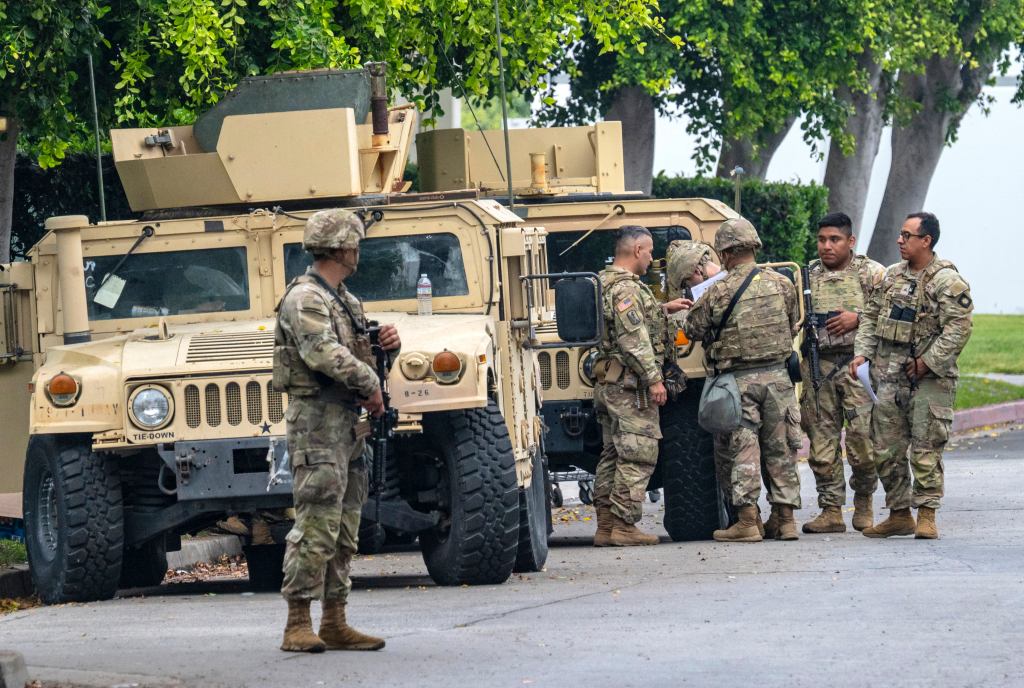
The Trump administration’s immigration enforcement efforts in Southern California have created “widespread fear” among employees, including those with legal immigration status, a group of Republican California legislators said in a recent letter to the president.
Led by Sen. Suzette Martinez Valladares, whose district includes Los Angeles and San Bernardino counties, the legislators said they support “efforts to identify, detain and deport violent criminals” who are in the U.S. illegally.
But they also said recent raids targeting violent criminals have swept up non-criminal migrants as well.
“Unfortunately, the recent ICE workplace raids on farms, at construction sites, and in restaurants and hotels, have led to unintended consequences that are harming the communities we represent and the businesses that employ our constituents,” they said in the letter to President Donald Trump.
“We have heard from employers in our districts that recent ICE raids are not only targeting undocumented workers, but also creating widespread fear among other employees, including those with legal immigration status. This fear is driving vital workers out of critical industries, taking California’s affordability crisis and making it even worse for our constituents.”
The six Republicans also asked for the Trump administration to modernize the country’s immigration process to allow for a pathway to legal status for non-criminal undocumented immigrants who have “longstanding ties to our communities.”
And they want Trump to expand temporary visa programs for agricultural and temporary workers so more legal workers can come to the U.S. and employers can more easily get vital workers, they said.
“America needs a system that reflects both compassion and lawfulness — one that upholds sovereignty while recognizing the reality on the ground,” they said. “The last president to successfully tackle this issue was Ronald Reagan nearly 40 years ago, and it is long past time to modernize our immigration policies.”
Aside from Valladares, the letter was signed by Senate Minority Leader Brian Jones of San Diego and Sen. Rosilicie Ochoa Bogh, whose district includes Riverside and San Bernardino counties. Orange County Assemblymembers Laurie Davies of Laguna Niguel and Diane Dixon of Newport Beach, as well as Assemblymember Heath Flora of Ripon also signed on.
“We are now urging the administration to prioritize public safety, while advancing immigration and visa policies that strengthen our economy, secure our borders and keep our communities safe,” Valladares said.
The Trump administration has ratcheted up federal immigration enforcement efforts across the country, but particularly in Southern California, in recent weeks.
Videos have shown masked federal agents, without warning to even local police, getting out of unmarked or lightly marked cars and swiftly detaining people. There have been reports of asylum seekers being arrested while appearing at routine court hearings and U.S. citizens being detained during enforcement operations.
Large-scale protests have broken out around Southern California as a result — which led to Trump deploying the military and federalized National Guard troops to Los Angeles. Gov. Gavin Newsom is challenging that action in federal court, where attorneys for the Trump administration have defended the move, saying the National Guard is needed to protect federal buildings and agents in Los Angeles amid “ongoing violence.” Without the Guard, they’ve argued, properties and people would be at risk.
A White House spokesperson did not immediately respond to a request for comment about the six Republicans’ letter Monday afternoon.
But while most of the letter urged change from the White House, it also criticized laws and policies championed by California’s Democratic supermajority.
California, the letter said, is “hurting” due to overregulation, rising costs and a labor market that is “strangling” businesses.
“The Latino community in particular has borne the brunt of many of the state’s far-left policies that, instead of serving them, only protect criminals and eliminate opportunity,” the legislators said.
Dixon, meanwhile, said she toured the southern border last year and alleged that California’s sanctuary policies — which limit resources from assisting federal immigration enforcement officers and efforts — have turned the state “into a magnet for illegal migration.”
“We are still facing the consequences of becoming a sanctuary state, which has led to countless illegal migrant criminals becoming repeat offenders of our legal system,” Dixon said. “Additionally, I have major concerns about the illegal fentanyl coming across the border and killing Americans, and the horrific crimes being committed related to human trafficking.”
Davies echoed those sentiments, saying, “for far too long, previous administrations have allowed unchecked illegal immigration to explode.”
“Commonsense immigration reform is quite simple: Deport those with criminal records and find a pathway to citizenship for those who have become productive members of their communities,” Davies said. “If we want our region secure, that involves securing our border. This will help us combat drug and human trafficking operations.”
“It’s time to leave party labels at the door and begin action on much-needed reform,” said Davies.



